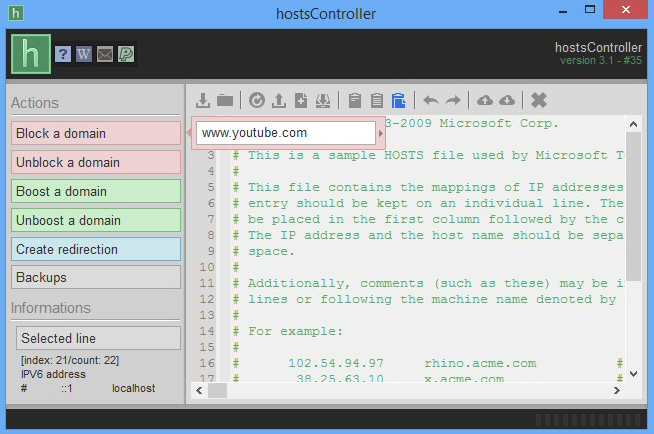Take charge of your HOSTS file with hostsController

Editing your PCs HOSTS file can help you block ads, restrict access to certain websites, or just get more control over your network traffic.
You could make all this happen with nothing more than Notepad, but it’s not exactly straightforward, and installing a copy of the free hostsController will make your life very much easier.
If you want to block access to YouTube, for example, there’s no need to manually find and edit HOSTS. Just launch hostsController, click "Block a domain", type youtube, press [Enter] and click "Save".
(You may also need to restart your browser, flush your DNS cache or just restart your PC before the change comes into effect. But that’s the same with most HOSTS editors.)
Unlocking a domain is just as easy, and there are bonus tools to "boost a domain" (improve access speeds by hard-coding a site’s IP address in your HOSTS), and "create redirection" (make one domain point to another, perhaps having www.bing.com take you to www.google.com).
If you’re in a hurry then the program also supports "Hosts file add-ons", lists of domains which you can apply all at once. As we write there are add-ons to block common pornographic sites, social networking domains or various ad providers.
Alternatively, if you’re an expert user the "Advanced Editor" allows you to view and manually tweak your HOSTS file, line by line.
Make a mistake with hostsController and it may cause problems, at least temporarily, by blocking access to one or more legitimate sites. But the program does its best to help by creating automatic backups of previous HOSTS files, and restoring them on demand. And you can even give hostsController a password, ensuring other users of your PC won’t be able to trash your carefully configured settings.
We came across a few interface annoyances during our hostsController tests. In particular, the program’s main window is too small and can’t be resized. This makes for plenty of unnecessary vertical scrolling; we occasionally found some options were just off screen, and couldn’t be read; and even when no scrolling was required, hostsController still displayed a pointless grayed-out scrollbar.
It would also be useful if the program had a "flush DNS cache" option, helping changes to take effect more quickly. And some documentation would be welcome, too.
None of these problems are fundamental, though, and there’s no doubt that the core hostsController functionality is very good indeed. If you need a better way to manage HOSTS then give the program a try.